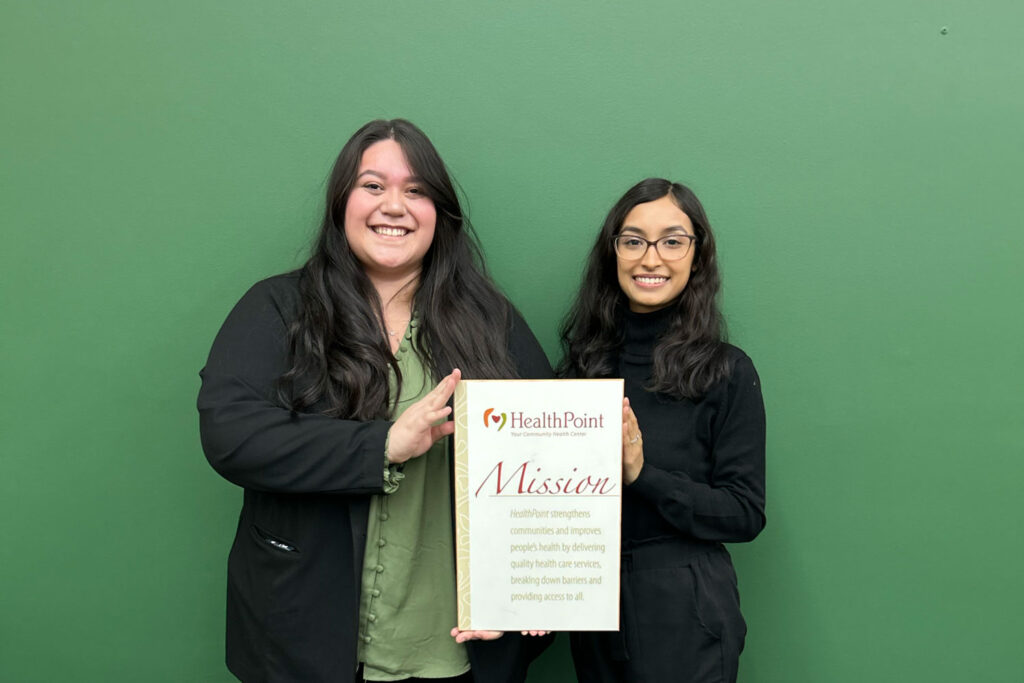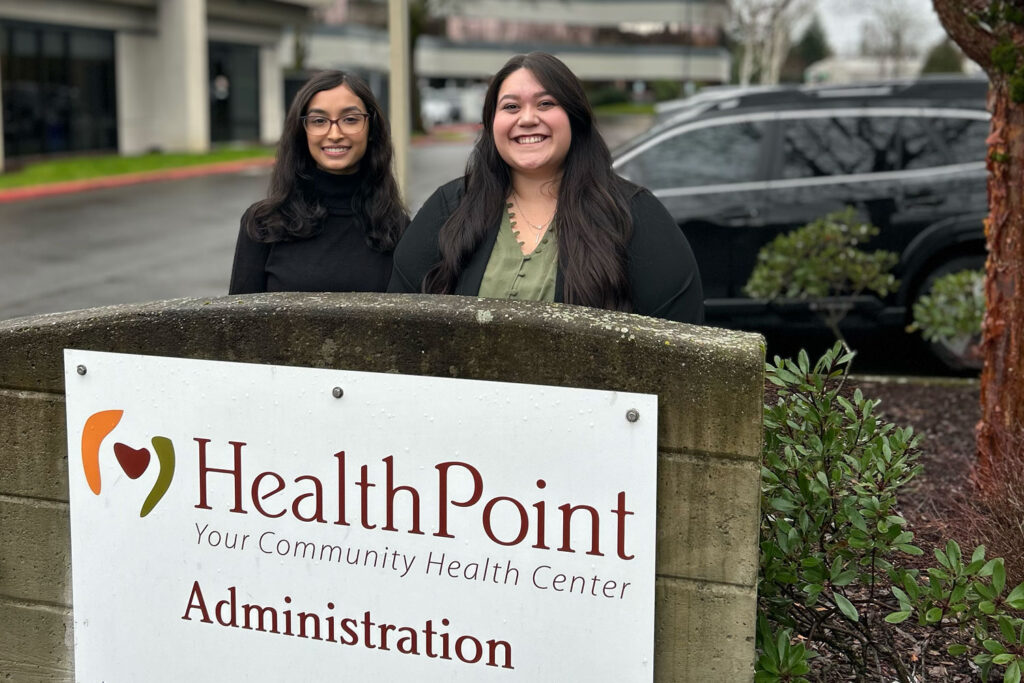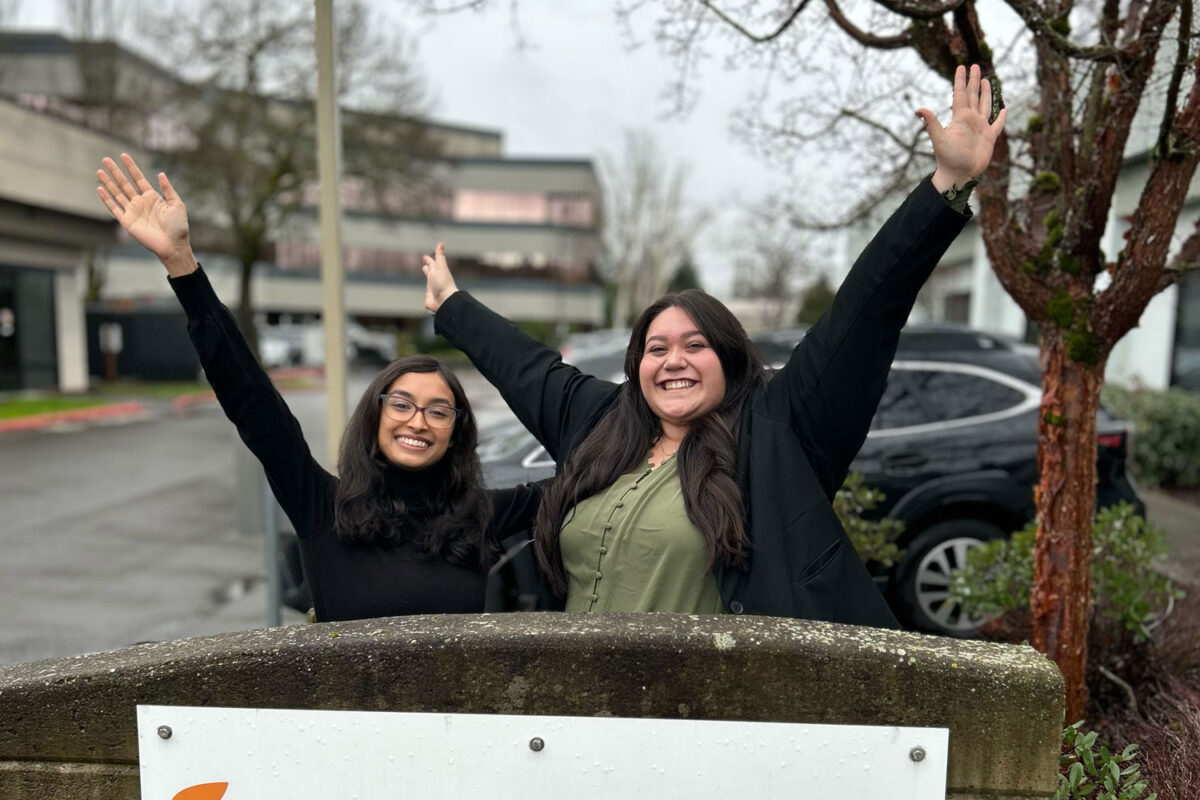For many, college can be a place to make connections that will last a lifetime. The community of a university extends well beyond its campus, and this is particularly evident at the University of Washington Bothell.
As nine out of 10 UW Bothell alumni live and work in the state of Washington, it’s no surprise that alumni often work together and stay connected long after they graduate — or even meet each other for the first time out in the “real world.”
Such was the case for Kashpa Khan and Isabella Humphries, two alumnae from UW Bothell’s Health Studies program who didn’t meet on the campus, but rather in the workplace.
As part of the Patient Engagement and Navigation team at HealthPoint — a nonprofit community health center based in the Greater Seattle area — Khan and Humphries now put their degrees to use helping provide medical care and community resources.
Finding the right path
Khan began her studies at UW Bothell as a Chemistry major, hoping to find a career in the STEM field. But by her fourth year, when she started thinking about her career post-graduation, Khan realized she might want something different for her future — in part because of the three years she worked as a peer adviser in the Student Success Center.

“As a peer adviser, I was having so many conversations with students who were trying to find their right major, but now I was the one who was unsure,” Khan said. “I loved chemistry, and I loved learning about it, but I couldn’t see myself really applying it into my career.”
As she began considering alternative pathways, she came across the Health Studies major offered through the School of Nursing & Health Studies. She knew it was the place for her — even if it meant being in school another year.
“I really wanted to do something to help communities through public health,” Khan said, adding that she felt drawn to health care administration.
“Because of my experience working as lead peer adviser, I knew I really liked giving structure, having organization and coming up with programs that are designed well and meant to have outcomes that support people,” she said. “My peer adviser role was really the gateway to the rest of my career, and I’m still so thankful for that opportunity.”
Launching a career
After graduating with a bachelor’s degree in both Chemistry and in Health Studies in 2019, Khan approached HealthPoint in search of an opportunity to gain hands-on experience in health care administration. She interned as a quality improvement assistant and realized it was somewhere she could see herself working long term.
Khan joined the team as a full-time patient engagement coordinator in 2021. Within her first year, she became the supervisor of patient engagement and navigation. She’s doubled her team from six coordinators to 12 in the past couple of years and enjoys the opportunity to hire health care professionals like herself.
In 2023, while searching for a new coordinator to join the team, Khan found the perfect fit in another Health Studies graduate from UW Bothell — Isabella Humphries (’23).
“It was an all-around moment of things coming full circle for me when I got to hire Isabella,” Khan said. “When she came in to be interviewed, she wowed everyone. I was so proud of how she showed up and represented the Health Studies program.
“I’m really excited that I get to now be a mentor to her and help her learn and grow in this position.”
I was so proud of how Isabella showed up and represented the Health Studies program. I’m really excited that I get to now be a mentor to her and help her learn and grow in this position.
Kashpa Khan, 2019 graduate in Chemistry and in Health Studies
Seeing the impact
In addition to sharing their alma mater, Humphries and Khan had similar pathways in that neither had planned to work in health care administration when they started at UW Bothell. Humphries was first on a pre-med track and later discovered an interest in public health.
“I wanted to be a doctor, but science isn’t as important to me as ethics and focusing on people,” she said. “I fell in love with the public health world, and a lot of that came from my experience at UW Bothell. That’s where my view of health care really started to shift toward wanting to make sure the social determinants of health are addressed.”
Humphries, too, got her start at HealthPoint as a quality improvement intern. Her work predominantly focused on making phone calls to patients who hadn’t been seen by a doctor in a while.
“It seemed mundane at first, but then when I looked at the statistics of what the phone calls were doing and the gap that we were closing, I realized how important the work was and how fulfilling it could be,” Humphries said. “I got to see the impact of the work I was doing in our metrics.”
Humphries recalled that some of the most rewarding phone calls were when a patient realized their lack of health insurance didn’t have to be a barrier to care, since Health Point’s fees were on a sliding scale.
Being a connector
Although she wasn’t looking for a full-time job in public health at the time, Humphries immediately clicked with the job description that her internship supervisor at HealthPoint shared, encouraging her to apply.

“It really spoke to me,” she said. “The job description not only embodied the motto of the Health Studies program, but it was also what I had wanted to see in health care my whole life. In a picture-perfect world, patients get the care they need from their doctor, but there’s also this important piece of the puzzle that’s often missing, which is the person who can connect them.”
As a patient engagement and navigation coordinator, Humphries now works with patients from a wide range of backgrounds and demographics through HealthPoint’s various programs. One of the main programs she supports is Refugee Health — a program Khan helped develop when she was a coordinator.
“We are the biggest medical primary care home for refugees, which is a really big deal, so we came up with the Refugee Health program to cater to the needs of new refugees resettling in the community,” Khan said.
Khan and her team connect patients to medical resources, yet much of their work also involves helping them get support for other basic needs — such as rental assistance and food.
“We know that health can be impacted by so much more than just health care. It’s also the social determinants of health,” Khan said. “Our team is able to dive deeper into their situation to provide support.”
Striving for equity
For both Khan and Humphries, connecting patients with the resources they need and knowing they made a difference is the most rewarding part of their job.
“Getting to inspire, lead and motivate my team to do as much as they can, as best as they can, for our community, that’s my biggest takeaway,” Khan said. “I’m really proud of the work that we’re able to do, and seeing the outcomes definitely speaks for itself.
“At the end of the day, I know the work we’re doing is very valuable. We’re bringing access to health care, and we’re doing it for vulnerable populations and patients who don’t all have the same access opportunity,” she said. “We’re striving for equity — and that’s really what makes the difference.”




